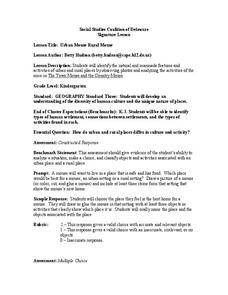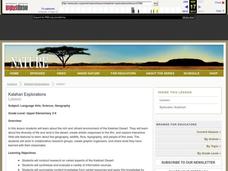Curated OER
The Influence of Human Activity on the Environment
The surge in human population in the last 2,000 years, due in large part to better health care, has brought a surge in the demand for resources and in pollution. The graphics, photographs, and real-life examples in a thought-provoking...
University of Waikato
Farming and Environmental Issues
Forming ethical arguments is sometimes a complicated task. Guide classes through a process for forming and presenting ethical opinions. Learners consider the views of all stakeholders on the impact of farming on the environment and the...
Curated OER
Lesson: Living With the Farm Next Door
Discuss with learners why farms are growing in size and why there is sometimes conflict between farmers and their non-farming neighbors. Read the article, "Living With the Farm Next Door," and then craft letters to the editor from the...
Social Studies Coalition of Delaware
Urban Mouse Rural Mouse
Explore rural and urban environments over the course of four days. Each day offers a new look into how both environment compare and contrast. Activities include the observation and analyzation of images, a read aloud and grand discussion...
Curated OER
Seed Diversity
Learners explore agriculture by researching different seeds. In this seed identification lesson plan, students collaborate in small groups to analyze a package of different seeds. Learners utilize a magnifying glass to examine each seed...
Curated OER
Earth: The Food We Eat, The Seeds We Sow
Students explore the importance of seed diversity for cultural and ecological stability/health. They discover what an heirloom seed is and why they are important to conserve.
California Academy of Science
Exploring the Impacts of Feeding the World
Approximately 50 percent of people in the world who are chronically hungry work in agriculture. While it seems counter-intuitive, the farther you live from a farm, the more food options are available. Scholars explore concepts related to...
Curated OER
Forest Ecosystem Field Trip
Students investigate the environment by participating in a class field trip. In this botany lesson, students attend a field trip through their local park or forest while listening to a nature guide. Students practice using their 5 senses...
Curated OER
A Sense of West Virginia
Students consider their perceptions of the world through their 5 senses while visiting the West Virginia State Museum. In this West Virginia history lesson, students discover how knowing about the past helps with their understanding of...
Curated OER
Kalahari Explorations
Students explore world geography by completing graphic organizers and researching the Internet. In this Kalahari desert lesson plan, students identify the geographic location, weather and creation of the Kalahari desert. Students define...
Curated OER
Bird Buffet
Fifth graders investigate how birds use their beaks. In this agriculture lesson, 5th graders use tools to simulate how birds gather food with their beaks. They then draw conclusions about certain types of beaks and what types of food a...
Curated OER
Worming Your Way Through the Soil
Students study soil, living and non-living particles in the soil, and learn about composting. In this soil study lesson, students study soil samples and discuss the living and non-living components of the soil. Students classify the...
Curated OER
Decomposers at Work!
Students design and conduct investigations that illustrate the process of decomposition. After a lecture/demo, students simulate the process of soil composting in the classroom. They closely chart the decomposition of their soil.














